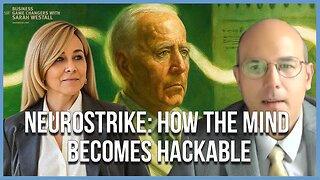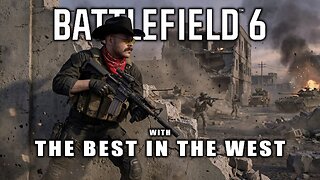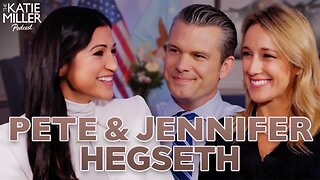Premium Only Content

Unlocking Your Truth: Family Lies, Self-Healing, and Finding Unity
The narrator reflects on personal growth, the importance of truth, and the journey towards self-improvement and unity.
[32:39-33:35]
The narrator realizes the impact of family lies and the lack of personal development during high school.
it was really like I had no opportunity to see people, to chill with people And when I actually could chill with my friends in high school or in the Catholic school, the public, whatever the public school, Catholic school, I wasn't in public school. I was in Catholic school, But in grade school anyway, before high school, I had very little experiences with people, with friends, like interacting with them, developing your character, where you can actually communicate with people and understand things. I was locked down No reason. My parents were strict. That's it. That's all it was. And then, going to high school, it was like I had this realization that From my own family, It's just about like you know how your family can lie to you, And it's like these are the people that are supposed to set you up for your life.
[34:13-34:52]
The narrator emphasizes the importance of understanding personal truth gained from life experiences.
I was like I got fucked over, not asking any questions. And now, when I realize how terrible the truth situation was in my family situation, about my life experience, I had to really develop the knowledge on my own And going through like my teens, late teens, twenties into where I am now being 34. The knowledge about truth is so important to everybody individually because we all have a truth that we go through and understand through our experience.
[34:52-35:32]
The narrator shares his truth, highlighting how societal control affects individuality.
And for me to have another experience to try to share my truth with you, my friend watching. just for an example, we may not necessarily be able to resonate on everything, particular topic or whatever, because our life experiences or life truths may not actually equal, but there are things that we can all, as men and women on this planet, that can come to understand the real truths that are going on, that are dividing us, that are actually corporations controlling people, because the people are not willing to control themselves.
[37:36-38:07]
The narrator discusses the need for self-reflection and healing from past pains.
But not one of us can do that without actually looking inside of ourselves, trying to heal ourselves and stop ignoring the pain that we have inside and just trying to numb the pain with whatever everybody else is doing. you know, i mean that's something that i went through a lot of my life, you know, and i still smoke a lot of weed because- and i i kind of understand that now, that's kind of what it is- because marijuana was the first thing that i actually had to do.
[41:36-42:18]
The narrator apologizes for past mistakes and expresses a desire to improve as a person.
I'm sorry. It's my bad. I apologize and I'm really trying to be a better No, sorry. I don't want to work because work is like this corporate concept. I'm going to do my best to maintain the type of quality of a man That I need to represent on this planet. To help better the people around me. If I can be a good example of what an amazing man can be. I want to be that quality.
[42:19-43:09]
The narrator emphasizes the importance of respect and acknowledges the negative impact he may have had on others.
And that quality is about Giving respect, giving love, giving attention, responding, and doing all the things that I probably haven't done in the past. And I acknowledge that I'm You know, I've pissed off a lot of people. I've upset a lot of people. And I probably have a lot of enemies out there. Go figure. And that's cool. But at the same time I'm just saying that I don't personally look at anybody that hates me or whatever has a negative thought towards me in that way. I don't want to look at people that way. So for me I'm sorry if I did something consciously or unconsciously that affected anybody to have that feeling about me. And it's not about trying to make any and everybody like me.
[43:48-44:09]
The narrator concludes with intentions of unity and understanding the diverse expressions of truth.
So you know what? It's never my intention. My intention is about unity, love, and trying to represent truth. And we all have an expression of truth. No truth is for anyone to But we can all resonate to truth in our own perspective that makes the complete picture of what we're seeing as the real truth.
-
 LIVE
LIVE
JDubGameN
1 hour agoStarlink Network Test Stream! | Road to 100 Followers
32 watching -
 2:17:31
2:17:31
The Daily Signal
5 hours ago $0.77 earned🚨BREAKING: Tennessee Congressional Election Results, Minneapolis Police to "Intervene" Against ICE,
7.02K4 -
 LIVE
LIVE
megimu32
1 hour agoON THE SUBJECT: Christmas Vacation Is UNTOUCHABLE!
111 watching -
 LIVE
LIVE
Sarah Westall
2 hours agoNeurostrike, Cognitive Targeting & the New Tech Arms Race w/ Professor Armin Krishnan
169 watching -
 2:52:28
2:52:28
Nikko Ortiz
4 hours agoNo More Gear Fear... | Rumble LIVE
11.7K1 -
 LIVE
LIVE
Razeo
2 hours agoTopside carnage with some fries.,
30 watching -
 1:03:17
1:03:17
BonginoReport
5 hours agoViolent Criminals Run Free in NY & CA - Nightly Scroll w/ Hayley Caronia (Ep.188) - 12/02/2025
113K34 -
 6:33:02
6:33:02
The Rabble Wrangler
18 hours agoBattlefield with The Best in the West
6.99K -
 LIVE
LIVE
heathen_streamz
2 hours agoLet's get Bent in ARC RAIDERS | Happy Tiddy Tuesday!
46 watching -
 41:54
41:54
Katie Miller Pod
6 hours ago $5.02 earnedPete & Jen Hegseth on Family Values, Job Transition, & Military Readiness | KMP Ep. 17
26.3K8